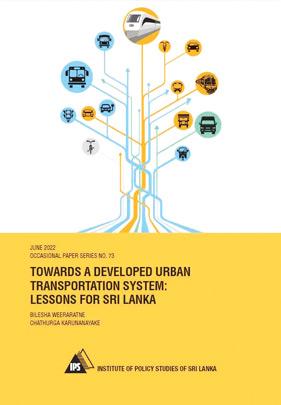
A new publication from the Institute of Policy Studies of Sri Lanka (IPS) calls for a legally binding master plan for public transportation in Sri Lanka, whereby urban transport will become a fully integrated system instead of a collection of projects.
The study notes that despite a broad planning context, the progress made in public transportation in Sri Lanka is limited. Therefore, it recommends creating a master plan with sufficient legal teeth to ensure continuity regardless of the administration in power, and policy consistency from formulation to implementation.
This latest IPS publication ‘Towards a Developed Urban Transportation System: Lessons for Sri Lanka’, is authored by Dr. Bilesha Weeraratne and Chathurga Karunanayake.
Using a case study approach, the authors examine transport initiatives adopted in Metro Manila in the Philippines, Bangkok in Thailand, and Hong Kong to glean lessons to improve public transportation in urban Sri Lanka.
Metro Manila and Bangkok are examined due to their similarity to Colombo and the Western Province in Sri Lanka, with high levels of traffic congestion for decades.
The Philippines and Bangkok are known for their successful efforts in addressing these congestion issues such as establishing a Light Rail Transit system, providing vital insights into overcoming problems prevalent in Sri Lanka’s urban transport system. Moreover, Hong Kong is an ideal case to offer lessons from its best practices to any city struggling to develop its transportation system.
These three cases were chosen purposefully. The following measures are recommended in view of the case studies examined:
Garner the support of the government, opposition and public, and create a legally binding master plan for public transportation in Sri Lanka. Take advantage of the private sector and work on an optimal public-private partnership (PPP) to invest in transportation projects. Instead of piecemeal projects, the government should retain the coordination and implementation role to ensure systematic public transport development.
Avoid vested interest and rent-seeking behaviour undermining the overall purpose and the plan of public transport initiatives.
Estimate realistic projections about ridership in public transport modes/projects. Update and revise the same periodically with the latest information and address common factors contributing to lower ridership.
Design individual projects to integrate with other projects and modes of transportation and successfully divert preference from private vehicles to public transportation.
Ensure policy coherence at the national level by vetting all policies for indirect implications, including mitigating traffic congestion.
